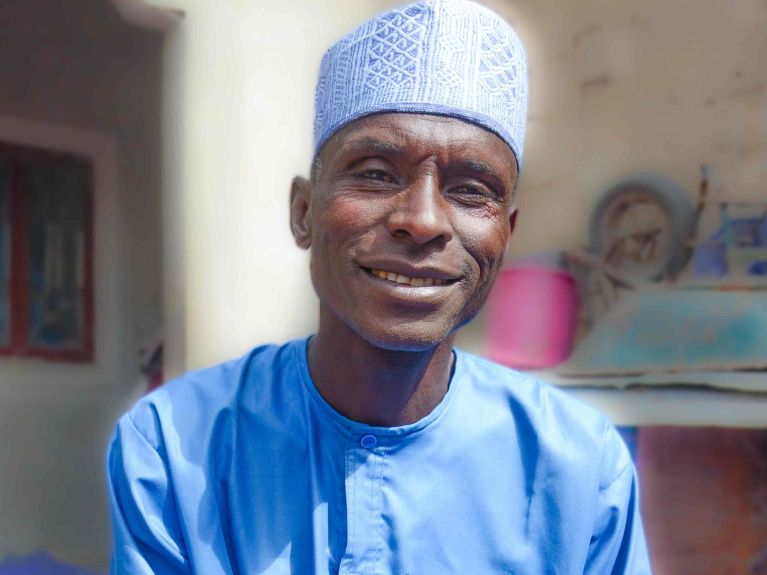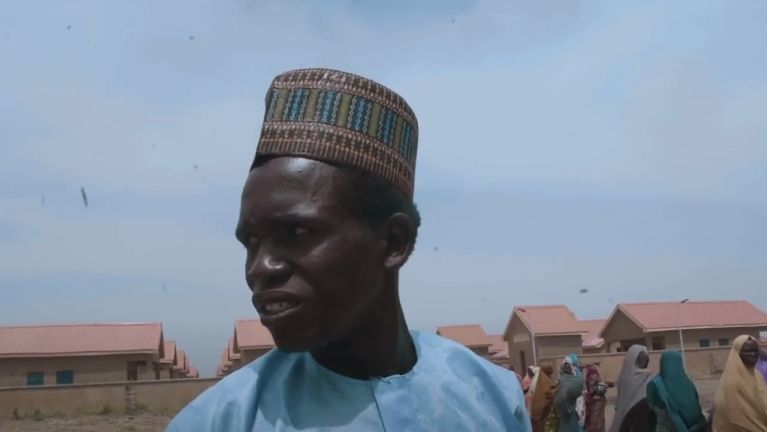Returning after the terror: a village is rebuilt
Bulama Dadi is the chief of a village in Nigeria that was completely destroyed by Boko Haram. The rebuilding of the village is helping to stabilise the entire region.

All of a sudden, Bulama Dadi was a village chief without a village. The mud huts and pastureland – destroyed; 2,200 women, men and children – scattered across the whole region after fleeing from the terror inflicted by Boko Haram. “Those were difficult times,” says the slim man in his early fifties, who took over the office of chief of Ngarannam from his father more than 20 years ago. The Fulani, Kanuri, Shuwa and Gamargu peoples lived together in this village in the northeast of Nigeria. The men raised cattle together, while the women produced traditional hats. When the terrorist group burnt the village down in 2015, however, Bulama Dadi could only watch as his community fell apart. The village inhabitants only met up again when they arrived at a refugee camp. At the time, any chance of their ever returning to Ngarannam seemed just a remote hope.
Bulama Dadi still remembers the day in 2019 when that changed. “We were sitting outside at the camp when people approached us who we had never seen before. They were looking for the inhabitants of Ngarannam.” He now knows that they were people working for theUnited Nations Development Programme UNDP. “They told us that our village was to be rebuilt.” Ngarannam is one of nine villages in the region that the Nigerian government has rebuilt with UNDP in recent years. They were supported by Germany, Sweden, the United Kingdom, the Netherlands and the EU. The reconstruction of the villages is part of an initiative to increase security and stability in the region and help those communities affected by the Boko Haram terror in Cameroon, Chad, Niger and Nigeria.
Everyone wanted to return, not a single one of us was against the idea.
Now that there was a prospect of returning to Ngarannam, Bulama Dadi was again finally able to do what he regards as his most important job: taking care of his community. During several gatherings, he and the other villagers discussed with UNDP how their new village should look. They wanted it to have a school and a health centre, plus power and water. “Beforehand, we had been asked whether we in fact wanted to return to Ngarannam at all,” explains the village chief. Despite the suffering they had experienced at the hands of Boko Haram: “Everyone wanted to return, not a single one of us was against the idea.”
Gradually, 500 houses were then built, alongside a school, a market square with 16 shops, a health centre and a water tower that holds 20,000 litres and has a solar-powered pump. Bulama Dadi was frequently consulted during the planning and construction phase, while a cash-for-work programme gave many villagers the chance to work on building the new village themselves - they helped on the construction site or planted trees and were paid a typical local wage. In addition, 250 households were given a grant to help them revive a business or set up a new one. 250 other families received support with their farming activities.
Dieses YouTube-Video kann in einem neuen Tab abgespielt werden
YouTube öffnenThird party content
We use YouTube to embed content that may collect data about your activity. Please review the details and accept the service to see this content.
Open consent formLife in the village today is better than it was before the “crisis”, as Bulama Dadi calls the period that threatened to erase his village from the map. When fleeing from government troops, Boko Haram fighters had hidden in the forests around Ngarannam. Time and again they would attack and plunder the village from there. During one attack they killed several women. It was a long and barbarous advance that ultimately led to the complete destruction of the village in 2015. Just like the residents of Ngarannam, millions of people in the northeast of Nigeria lost their homes at the time and ended up internally displaced, living with relatives or in camps. Thanks to the stabilisation initiative, many of them have been able to return: in all, more than 2,000 new homes have been built in the three Nigerian states of Adamawa, Borno and Yobe.
The villagers discover that their government will look after them and is committed to their security.
“The rebuilding of Ngarannam is an example of how people in crisis countries - even after having experienced the most heinous crimes - can build a future again,” says Anka Feldhusen, the commissioner for crisis prevention and stabilisation at Germany’s Federal Foreign Office. Germany is committed to actively countering terrorism for the benefit of the people, she explains. “The villagers discover that their government will look after them and is committed to their security. When things like market places and schools are built, basic needs can be met again.” This gives rise to trust and confidence, which in turn forms the basis for lasting peace, she adds.
The people now feel safe again in Ngarannam, confirms Bulama Dadi, who has 17 children himself and now breeds cattle again in the village. The village is better protected these days: there is a police station staffed by around 30 people, as well as a five-kilometre-long trench around the village. What are Bulama Dadi’s hopes for the future of his community? “Grants for the children and young people,” he says. So that they can continue their education after completing primary school in Ngarannam.









